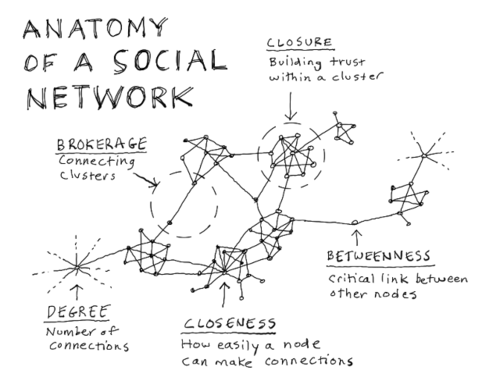Network anatomy of the EU online public sphere
Imported from the Blogactiv.eu blogging platform, closed without warning in 2021. Links, images and embeds not guaranteed, and comments not displayed.
[update, 31/12/2013: literally hours after this post came Tony Lockett's Mapping the EU digital public sphere(s)]

The above image is from Drake Baer's FastCompany article "Why Successful People Have So Many Groups Of Friends", which is all about networking for career success, something I've never done and am very unlikely to start.
Nevertheless I recommend it as it's also an excellent article on network theory, which is central to understanding the EU online public sphere. Let's start with some quotes:
"ideas are like germs: they don't diffuse through populations of people at random; they make their way through networks--that is, the relationships you have with people and the connections they have with others. ... we tend to form clusters of relationships"
Right now, conversations in Europe about policy take place in 29 clusters - 28 national conversations, plus the Brussels Bubble. The links between these clusters are weak, which has consequences. But first, some more info about what happens within clusters:
"Clusters get stronger as people form mutual friendships, establish norms, and gain reputations... [within a cluster] Information goes faster and faster and gets repeated again and again ... leading to unwritten rules and normalized, reinforced behavior. Information doesn't move between groups: Since you start speaking in shorthand - whether it's ROIs or ROFLs - you begin to be less intelligible to outside groups. As a result, knowledge stays within one group and doesn't move ."
Groupthink in the Jargon-fuelled Brussels Bubble, anyone? So far, so normal (if this is all new to you, I also recommend The Primal Forces that Drive Social Networks).
Brokering the conversation
The key point here is that forming links between clusters - brokerage - is essential:
"We tend to stay within our clusters... Staying put feels good, as you acquire a reputation and social validation within your peer group... stepping into other clusters makes you vulnerable to new ideas. A broker makes the information market more fluid ... Great ideas will never move if we wait for them to be spoken in the same language. ... The more that you live between clusters, the more exposed you'll be to different ideas."
While this validates Hashtag Europe's focus on helping ideas and information spread more easily between clusters - and hence across Europe - it helps to remember that these ideas flow between people, not impersonal web servers. Perhaps I should network a bit more.
Related reading
More Stuff I Think
More Stuff tagged network , bloggingportal2 , publicsphere , social media , lobbying
See also: Online Community Management , Social Media Strategy , Content Creation & Marketing , Social Web , Media , Politics